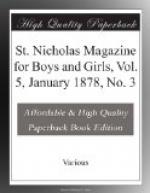“The barometer is another instrument in which quicksilver is used. It is intended to measure the weight of the air, therefore the quicksilver in it must be exposed to the pressure of the air. Common barometers have it inclosed in a small leather bag at the back of the instrument. This we do not see, but only the tube which is connected with it. When the weather is pleasant, the air, contrary to the general idea, being heavier, presses against this little bag and the quicksilver rises in the tube. When the atmosphere is damp, the pressure being less, the metal sinks.”
“Grandpa,” said Harry, “when you think of it, isn’t quicksilver a funny word?”
“Yes; it was so named by people who lived many hundreds of years ago. They called it living silver also. It is the only metal found in a liquid state; and so many strange changes did it pass through under their experiments, that it seemed to them really a living thing. If they tried to pick it up, it would slip out of their fingers. When thoroughly shaken, it became a fine powder. They boasted that it had the faculty of swallowing any other metal, while powerful heat caused it to disappear entirely. It is now known among metals as mercury. Can you tell me, Fred, some of the metals?”
“Oh yes, sir! There are gold, silver, iron, lead and copper.”
“That is right. But, you know, all these are hard; some of them can be chipped with a knife, but they cannot be dipped up in pails, unless they have first been melted. Yet mercury can be frozen so hard that it may be hammered out like lead, and sometimes it takes the form of square crystals. Yet it can be made to boil, and then sends off a colorless vapor.”
“Grandpa.” said Fred, who had scarcely listened to the last words, “if mercury can be dipped up in pails, it must be very easy to get it. I read somewhere that gold and silver are so mixed in with the rock that it takes a great deal of time and money to separate them.”
“That is true; but mercury is not always obtained easily. It forms part of a soft, red rock called cinnabar, composed of mercury and sulphur. The cinnabar is crushed and exposed to heat, when the metal, in the form of vapor, passes into a vessel suited to the purpose, where it is cooled. Then, being reduced to its liquid state, it is pure and fit for use. When men working in the mines heat the rocks, the quicksilver will sometimes roll out in drops as large as a pigeon’s egg, and fall on the ground in millions of sparkling globules. Think how very beautiful it must be, the dark red rock glittering on every side with the living silver, while every crack and crevice is filled with it!
“Visitors to the mines of Idria are shown an experiment that I think would interest you boys. In large iron kettles filled with mercury are placed huge stones, and these stones do not sink.”
“Why, grandpa! how can that be?”
“Did you ever see wood floating on water?”




